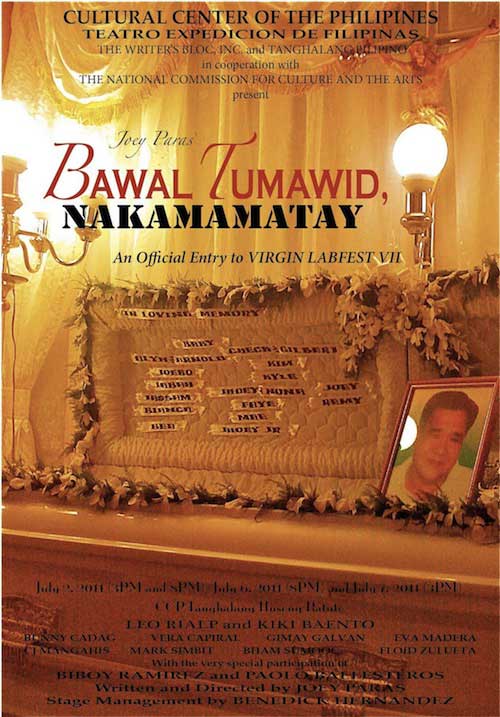The comedy with which death is dealt in two plays at the Virgin Labfest 7, presented at the Cultural Center of the Philippines, was in no way extraordinary. After all, we’re in a country where laughter in the face of difficulty is cliché. Yet what might be extraordinary in both The Valley Mission Care written by Russell Legaspi and directed by Missy Maramara, and Bawal Tumawid Nakamamatay written and directed by Joey Paras, is precisely its reconfiguration of these clichés into notions of letting go and letting things be. The two plays are given contexts that are particularly of the current times, anywhere that there’s a friendly smiling Filipino.
Bawal Tumawid Nakamamatay sets itself up as a comedy the moment it begins with Donna Cruz’s
“Kapag Tumibok Ang Puso." The music is sustained throughout the narrative by two street troubadours -- one on guitar, the other on flute -- entering the narrative exactly when we imagine a theme song to be in order. To the tune of this music and the din of Metro Manila traffic and rain is one Valentine’s Day afternoon on a random sidewalk, with pedestrians passing through and stranded on the streets. This is where a conversation begins between Mang Caloy (Leo Rialp) and Eva (Kiki Baento), unlikely as their pair is. Eva is dressed like she’s ready for a party, when she’s actually on her way to her father’s burial; Mang Caloy looks like your random
manong on the street waiting for his date. Eva’s loud larger-than-life persona dominates the conversation as she tells of a working class life, riddled as that is with stories of difficulty made absurd by a storytelling with a smattering of gay lingo, raised eyebrows, crazy laughter. This was antithesis to the silence that surrounded Mang Caloy’s character, he with a bouquet of flowers, dressed to his version of the nines, with a date that will never come. His story isn’t funny as it is tragic, and it’s here that his character is revealed to be less than that of Eva, that is, less thought out within the narrative itself. For while it makes sense that Mang Caloy would have an amount of anger in him, it doesn’t make sense that he would flare up at Eva, even to the point of hurting her. There is no reason to see him as lovable, not even
simpatico as old men could be. And so it was a stretch too that in the end there would be love between Eva and Mang Caloy, when all that seemed probable was a daughter-father kind of relationship. Which isn’t to say that
Bawal Tumawid Nakamamatay wasn’t funny; it was funny in the way slapstick and loudness, as well as characters – and actors! – with perfect timing necessarily are. Gimay Galvan as the coffee shop barista going through her own love crisis on Valentine’s Day was perfectly consistent as the angry lesbian, as was Rodel Bar Sumooc as the cigarette vendor who would pass through and give his unsolicited two cents’ worth to the conversation. Baento is perfectly fag hag working class, the comedy emanating from her self-assured performance, weight, flashy dress and all. Rialp, given the limits of Mang Caloy’s character, surprisingly blazes into anger and regret and sadness at the point when his story unravels, glaring at the distance even when he is reminiscing. It’s the one moment when Mang Caloy’s character makes sense, and Rialp must take the credit for acting that was luminescent.
It’s also the actors who might take credit for
The Valley Mission Care, making up for a script that seemed too slow for its own good. Of course, this is a story that happens in an old people’s home in America, and in that sense the slowness might be defensible. But at the same time, this story’s main protagonists were fueled by a certainty that could’ve made for a speedier narrative. Yes, despite old man Francisco Manatili (Siegfried Sepulveda), a Filipino resident of The Valley Mission Care, feeling relieved to find that his new nurse was Filipina Ashlyn (Mayen Estañero). Here the old man would stage a courtship of sorts, some strategies too romantic for comfort, to get Ashlyn to break the rules so soon after being hired at The Valley. Lolo Cisco is a man with a mission to see his long lost love on a beach far away. This mission was also about freedom from The Valley, a prison of sorts for the spritely old man. Ashlyn was heaven sent for Lolo Cisco, and he lost no time in appealing to her inner-romantic, if not her hidden-Pinoy: do this for me
hija, do this for yourself. Ashlyn struggles between her job and her guilt and ends up helping Lolo Cisco anyway. Here, Ashlyn’s struggle is stretched out a wee bit, with no real sense of what’s going through her head, how she reconciles it within herself. And it’s here that Estañero shines. In the end, her connection with Lolo Cisco, while not made logical by the narrative, is revealed by Estañero to be about a sincere honest compassion. When in the end she tears up, it’s difficult not to be carried away, sunrise and all. Sepulveda meanwhile plays Lolo Cisco with a perfect balance of fieriness and weakness, with excitement and weariness in his eyes. The success of this narrative was one of its lacking elements: there was no sense of pity for the old man here, as his age became about his final fight for freedom. Everything’s a matter of fact, even with regards death, as The Valley Mission Care portrays it as something we control. And here lies the power of Legaspi’s storytelling -- where the Filipino is your every old man, where The Valley is the saddest place on earth, where the old know to live their lives to the fullest, the young are made to reckon with death as truth. There’s a decisiveness about death here; death is something we walk into. This might be said as well about crossing a busy highway on Valentine’s Day, even with a huge sign that warns against it. In the midst of a rushed and complex urban existence in Manila, and the quiet rigid comforts of an old people’s home in America, death is a specter. And while both
Bawal Tumawid Nakamamatay and
The Valley Mission Care elicit an amount of laughter, on the stage both succeed at becoming portents of what lies at the end of the road. -
YA, GMA News 






